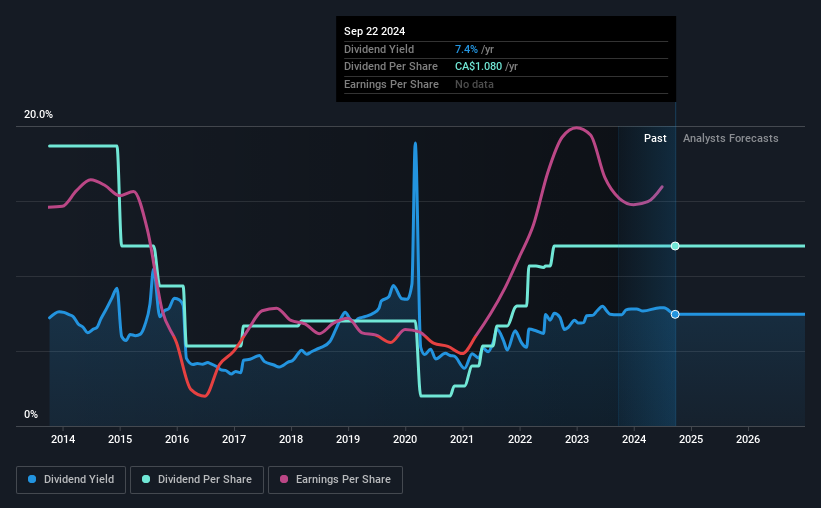- Canada
- /
- Oil and Gas
- /
- TSX:FRU
Why It Might Not Make Sense To Buy Freehold Royalties Ltd. (TSE:FRU) For Its Upcoming Dividend

Freehold Royalties Ltd. (TSE:FRU) stock is about to trade ex-dividend in four days. The ex-dividend date is usually set to be one business day before the record date which is the cut-off date on which you must be present on the company's books as a shareholder in order to receive the dividend. The ex-dividend date is an important date to be aware of as any purchase of the stock made on or after this date might mean a late settlement that doesn't show on the record date. In other words, investors can purchase Freehold Royalties' shares before the 27th of September in order to be eligible for the dividend, which will be paid on the 15th of October.
The company's upcoming dividend is CA$0.09 a share, following on from the last 12 months, when the company distributed a total of CA$1.08 per share to shareholders. Calculating the last year's worth of payments shows that Freehold Royalties has a trailing yield of 7.4% on the current share price of CA$14.51. We love seeing companies pay a dividend, but it's also important to be sure that laying the golden eggs isn't going to kill our golden goose! As a result, readers should always check whether Freehold Royalties has been able to grow its dividends, or if the dividend might be cut.
See our latest analysis for Freehold Royalties
If a company pays out more in dividends than it earned, then the dividend might become unsustainable - hardly an ideal situation. Freehold Royalties paid out 109% of its earnings, which is more than we're comfortable with, unless there are mitigating circumstances. Yet cash flows are even more important than profits for assessing a dividend, so we need to see if the company generated enough cash to pay its distribution. Over the past year it paid out 184% of its free cash flow as dividends, which is uncomfortably high. We're curious about why the company paid out more cash than it generated last year, since this can be one of the early signs that a dividend may be unsustainable.
Cash is slightly more important than profit from a dividend perspective, but given Freehold Royalties's payouts were not well covered by either earnings or cash flow, we would be concerned about the sustainability of this dividend.
Click here to see the company's payout ratio, plus analyst estimates of its future dividends.

Have Earnings And Dividends Been Growing?
Businesses with strong growth prospects usually make the best dividend payers, because it's easier to grow dividends when earnings per share are improving. If earnings fall far enough, the company could be forced to cut its dividend. It's encouraging to see Freehold Royalties has grown its earnings rapidly, up 53% a year for the past five years. Earnings per share have been growing rapidly, but the company is paying out an uncomfortably high percentage of its earnings as dividends. Generally, when a company is growing this quickly and paying out all of its earnings as dividends, it can suggest either that the company is borrowing heavily to fund its growth, or that earnings growth is likely to slow due to lack of reinvestment.
Another key way to measure a company's dividend prospects is by measuring its historical rate of dividend growth. Freehold Royalties has seen its dividend decline 4.3% per annum on average over the past 10 years, which is not great to see. It's unusual to see earnings per share increasing at the same time as dividends per share have been in decline. We'd hope it's because the company is reinvesting heavily in its business, but it could also suggest business is lumpy.
To Sum It Up
Is Freehold Royalties worth buying for its dividend? Earnings per share have been growing, despite the company paying out a concerningly high percentage of its earnings and cashflow. We struggle to see how a company paying out so much of its earnings and cash flow will be able to sustain its dividend in a downturn, or reinvest enough into its business to continue growing earnings without borrowing heavily. It's not an attractive combination from a dividend perspective, and we're inclined to pass on this one for the time being.
Having said that, if you're looking at this stock without much concern for the dividend, you should still be familiar of the risks involved with Freehold Royalties. For example - Freehold Royalties has 1 warning sign we think you should be aware of.
Generally, we wouldn't recommend just buying the first dividend stock you see. Here's a curated list of interesting stocks that are strong dividend payers.
New: AI Stock Screener & Alerts
Our new AI Stock Screener scans the market every day to uncover opportunities.
• Dividend Powerhouses (3%+ Yield)
• Undervalued Small Caps with Insider Buying
• High growth Tech and AI Companies
Or build your own from over 50 metrics.
Have feedback on this article? Concerned about the content? Get in touch with us directly. Alternatively, email editorial-team (at) simplywallst.com.
This article by Simply Wall St is general in nature. We provide commentary based on historical data and analyst forecasts only using an unbiased methodology and our articles are not intended to be financial advice. It does not constitute a recommendation to buy or sell any stock, and does not take account of your objectives, or your financial situation. We aim to bring you long-term focused analysis driven by fundamental data. Note that our analysis may not factor in the latest price-sensitive company announcements or qualitative material. Simply Wall St has no position in any stocks mentioned.
About TSX:FRU
Freehold Royalties
Engages in the acquiring and managing royalty interests in the crude oil, natural gas, natural gas liquids, and potash properties in Western Canada and the United States.
Good value with adequate balance sheet.


